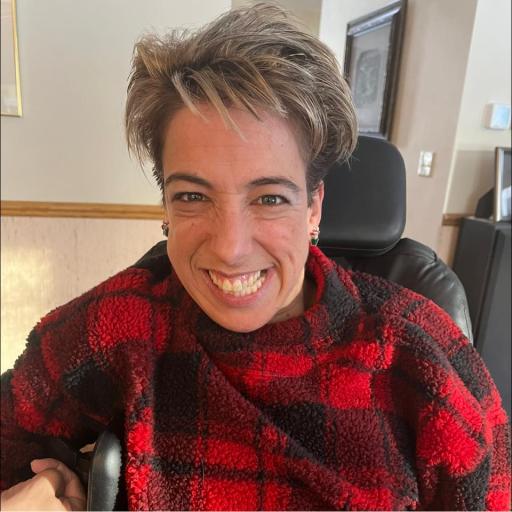
Stacy's Journal: Sisterly Love
No matter how many years apart you are, how many kids there are, or how close of a family you have, if you have a brother or sister, there is going to be some amount of sibling rivalry. Having a child who has special needs in a family doesn’t change that. As I’ve mentioned in previous entries, I have a younger sister, Stephanie. We are four years apart.
When we were growing up, we fought and got in trouble just like other sisters would. I’d pull her hair and run over her toes with my power chair, and she’d disengage my chair so I couldn’t move it and move things out of my reach! Like all kids, Steph stole my clothes and used to tell minor fibs to our parents, and I would rat her out. I wasn’t an angel either. I’d get in trouble for something, try to blame it on her, and sometimes mom and dad would believe me!
When children are growing up with a sibling who has some sort of disability, it may appear that the parents give more attention to the brother or sister with special needs. It appears that way because a sibling with the disability may need some extra assistance with various tasks. Though at times, it’s hard, the developmentally typical child will realize that just because mom and dad has to spend more time helping her brother or sister, it doesn’t mean that they love them more. It’s realized that the extra attention that is given to the child who has special needs isn’t necessarily wanted, but might be necessary. Steph had to do a lot of stuff on her own because our parents had to take care of me. An example I remember is when she was in 6th grade, she went to Washington D.C. for chorus. It was over her birthday, and my mom couldn’t go along because she had to stay and take care of me.
The difference in adult attention is not the only factor that affects sibling relationships. The typical child may have to deal with issues and do some things that a “normal” brother or sister will never have to. From going all around a building to find an accessible entrance to dealing with people who stare or treat their sibling wrong, the typical child adapts to a different lifestyle. At times, it’s not easy, but it’s part of life for the family. Steph also has had to explain my disability to her friends as well as defend me from people who make fun of me. She also does some of my personal cares such as feeding me without even thinking twice about it. Little ways of helping me have become automatic to her.
For the sister or brother with a disability, it’s not always easy either. Watching their “normal” brother or sister accomplish things that they know they will never be able to do can be difficult. When we were younger, it were things such as watching her playing in a soccer game, to doing simple chores around the house, to getting her drivers license and dating, that were hard to witness knowing I’ll probably experience those very normal things.
Over the last few years, as we’ve gotten older, our relationship has changed. Much to no surprise, after attending hundreds of my therapy sessions when she was young, Steph became an occupational therapist. She often tries to help me by suggesting some therapy techniques to make life easier for me. Admittedly, being the older sister, I often have a hard time taking her advice seriously even though I know she’s right. Steph too has to remind herself that she needs to be my sister first rather than a therapist. We’re getting better at finding a happy medium.
Recently, we’ve entered a new phase of life as Steph became engaged to a wonderful man. As one would guess, this milestone isn’t the easiest for me to accept. Don’t get me wrong, her fiancé is great and I’ve come to love him; it’s just that seeing my sister in love makes me wish it’d happen to me. It’s not easy, but I’m trying to experience happiness through her eyes. I do my best to be as supportive as I can, but Steph understands why at times things can be hard for me emotionally.
I’m well aware too that it takes a special guy to marry someone who has a sister with a significant disability. Early on, I’m sure Steph had to explain my circumstances to him. Again, it’s not an easy conversation to have, but Steph did it because she loves me and wants me a part of her life forever. Her fiancé has accepted and embraced the situation which I’m forever grateful for.
Steph and I have started talking about the future—when our parents are no longer able to assist me with things. I never ever want to be a burden to her life (and that’s something I’ll always be very cautious about), but Steph wants to be there for me when that time comes. Down the road, I’ll likely move closer to her, so she can assist me. “That’s what family is for,” she says.
I know having a sibling with a disability isn’t always easy. Steph has sacrificed a lot for me, but she says it has made her stronger. Words can’t begin to express how blessed I am to not only have her as my little sister, but also a best friend!
***The views expressed here are strictly those of the author and do not necessarily reflect those of InControl Wisconsin, the Network or any of our sponsors.
